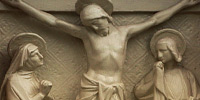REZA ASLAN (Author, Zealot: The Life and Times of Jesus of Nazareth): I think it’s incorrect to say that the followers of Jesus, and certainly the church fathers in the second and third centuries, changed Jesus’ message. I think that’s an incomplete statement. The fact of the matter is that Jesus’ message was in a constant state of change. Remember, none of these words were written down until, at the earliest, 70 A.D. That’s about 40 years after Jesus’ death when the first Gospel, the Gospel of Mark, was written. And the Gospel of Mark was not written until after the destruction of Jerusalem, the destruction of the temple, and the period in which Judaism itself had become a kind of pariah religion, an illegitimate cult, in the Roman Empire. So, the Gospel writers at that point began this process that was really, in many ways, already underway, which was to sort of transform and redefine, reapply Jesus’ message, particularly for a non-Jewish audience. And so that process really continued until the middle of the fourth century, when, as a result of Constantine’s conversion to Christianity, an attempt was made to actually create a sense of orthodoxy. But really, up until that point, you can’t say that there was any such thing as Christianity. What we really see is Christianities, in fact, many, many dozens of versions of it.
I’ve had a unique experience with Jesus, both as a worshipper and as a scholar studying him. I feel like it’s given me a different kind of perspective. On the one hand, knowing what it is to worship Jesus has given me a profound sense of respect for the faith of Christianity. As I have often said, some of the most important people in my life are Christians. My mother, my wife... Um, I myself was a Christian. I have no interest in attacking Christianity, or in challenging anyone’s faith. It’s just not what I’m about. But I also, as a historian and a scholar of religions, have been able to look at Jesus in a sense unburdened by dogma and doctrine. I’ve had the freedom to explore him in such a way that even if what I discover overturns, you know, my traditional views of him, I don’t have to feel afraid or anxious about that. And so, I hope that that perspective, that dual perspective, comes across in this book. I think it has. I’ve received nothing but an overwhelmingly positive response from Christians, many of whom have told me that despite the fact that they disagree with my central thesis, and despite the fact that they believe that the man that I’m describing is God, that understanding his time and his place, the world in which he lived and how that world affected him, has only empowered their faith, as made him more real in a sense.
This book Zealot overturns pretty much everything that Islam also believes about Jesus, and I’ve gotten, you know, my fair share of criticism from Muslims, as I have some from Christians, from conservative Christians, certainly, about that. I think that this notion about the faith of a scholar affecting his scholarship comes from a lack of understanding of religion as an academic discipline. Obviously, religion is a very deep and personal thing for billions of people around the world, and it becomes very hard for some people to understand that it is also an academic discipline. It is also something that you study as a science. My colleagues are Buddhists who write about Judaism and Hindus who write about Christianity and Christians who write about Islam, and although it’s certainly the case that pure objectivity is impossible in any endeavor, certainly when it comes to history there is no such thing as objective history, and perhaps one can say that that is even more so when it comes to sacred history. But, you know, we scholars, we try very, very hard to maintain our academic integrity and our objectivity when we write whether about our own faith tradition or about anyone else’s faith tradition, so I can say with all honesty that Islam has played zero role in my academic studies and Jesus, truly, if I were to say what did influence me the most in my academic studies, it was my, the professors who first shepherded me through my studies in the New Testament, and that’s the Jesuit priests that I studied with at Santa Clara University. They were the first ones who taught me how to read the Gospel in its historical context. They were the first ones who taught me how to search for the historical Jesus.
Probably the key to understanding who Jesus was and what he meant takes place at the end of his life, in this series of scenes in his first entry into Jerusalem, beginning with the Triumphal Entry in which he declares himself to be the king of the Jews by fulfilling the prophesy of Zechariah and riding in to Jerusalem on the back of a donkey as the king is supposed to do. He caps that very provocative entry with the so-called cleansing of the temple scene. He enters the temple, the so-called Court of the Gentiles, he kicks over the tables of the money-changers, whose job it was to transfer, to change, the foul foreign currency of Rome with the Hebrew shekel, which was the only currency that the temple would accept. He breaks open the cages that held the birds and the animals for sacrifice, which, after all, was the chief purpose of the temple, and then in a loud, booming voice, he says that “It is written that my house shall be a house a prayer for all nations and you have made it a den of thieves.”
Well, I think in traditional Christian imagination, this story, which exists in all four Gospels but is often glossed over as though the Gospel writers are either unaware of its significance, or deliberately downplaying it, tend to see this as some sort of spiritual act. It’s not a spiritual act. First and foremost, Jesus is wrong. These moneychangers, the Gentiles, in a matter your race or ethnicity, or religion, all people had a right to be the Court of Gentiles, that’s what the purpose of it was. And secondly, any one standing next to Jesus watching this act of violence against the temple would have understood it as an act of treason. After all, in the first century, the Roman occupation and the priestly aristocracy were considered one and the same force. Any attack on one would have been deemed an attack on the other. Indeed, it is the attack on the temple that precipitates his arrest, which happens almost immediately afterward.
This is general consensus of most scholars, that this moment is the moment in which this, up to this point fairly unknown preacher of the Galilee, who had spent the majority of his ministry in the countryside of the Galilee and who had just entered Judea for the first time and walked into Jerusalem for the first time, makes his presence known with this dramatic act of treason that ultimately leads to his crucifixion. I think one thing that is important to understand is that crucifixion under Roman law was a punishment that was reserved almost exclusively for crimes against the state, crimes like treason, sedition, insurrection, rebellion, if you were crucified, you were crucified for being a rebel against the state. And this act is perhaps the most obvious and unavoidable example of Jesus’ rebellion.
If you are going to convert the Gospel message to a Roman audience, you have to do three basic things. Number one, you have to make Jesus less Jewish. In other words, you have to remove the ethno-nationalistic context for his teachings. You have to turn his teachings into abstract universal principles that all people, regardless of their ethnic or religious background can abide. Number two, you have to make Jesus a little less revolutionary. You can’t convince Romans to follow the teachings of a man whose ultimate purpose in wanting to usher in the rule of God was to usher out the rule of Caesar. And so begins this attempt to temper Jesus’ revolutionary impulse as much as possible, to claim that his, the kingdom of God that he espoused was not an Earthly kingdom but a heavenly kingdom, that his messianic functions were not to be ah, carried out on Earth but in heaven, etcetera, etcetera. And third, and perhaps most importantly, you have to remove all blame from Rome for Jesus’ death, and this begins this steady process from the Gospel of Mark all the way to the Gospel of John, which was written sometime around 100 to 120 A.D. in which little by little, the blame for Jesus’ death is taken out of the hands of Rome and placed upon the Jews, launching of course, two thousand years of Christian anti-Semitism.
That shift in the Gospel message did two things. One, it make this message far more appealing to Romans and indeed paved the way for the Roman adoption of Christianity, changing Christianity itself, and two, it began the process of utterly divorcing Christianity from its parent religion, Judaism. Since Jesus was not really a Jew anymore, since his concern wasn’t really about the nation of Israel, and since it was in fact the Jews who put him to death anyway, then you see how this break with Judaism all of a sudden occurs, and Christianity becomes a deeply Romanized, Hellenized religious tradition, and indeed, that’s the Christianity that we know today.
If you were to compare the historical Muhammad and the historical Jesus, they would have actually a lot in common with each other. And this is true, I think, of all prophets. We have a tendency to think that prophets are inventors of religion. They are not. Jesus didn’t create Christianity. Jesus was a Jew. His purpose was to reform Judaism. The Buddha did not create Buddhism. He was a Hindu. His purpose was to reform Hinduism. Muhammad did not create Islam. Muhammad as he repeatedly says in the Quran was simply trying to reform the Jewish and Christian traditions that were so prevalent in the Arabian Peninsula. In many ways, we have to think of prophets as social, economic, political, religious reformers. And that’s, that’s I think what Muhammad and Jesus would have in the most in common. I mean, both of them preached against economic injustice. Both of them fought against the, the religious and political powers of their day on behalf of the outcast and the marginalized. And both of them, you know, died before their movements were turned into institutions, and indeed I think if they were both here today, both of them would be equally confused by the religions that claim to have been based on their teachings. There is, I think, in both the case of Islam and the case of Christianity, a pretty wide chasm between what the institutions of the faith say and what the prophet himself said.




